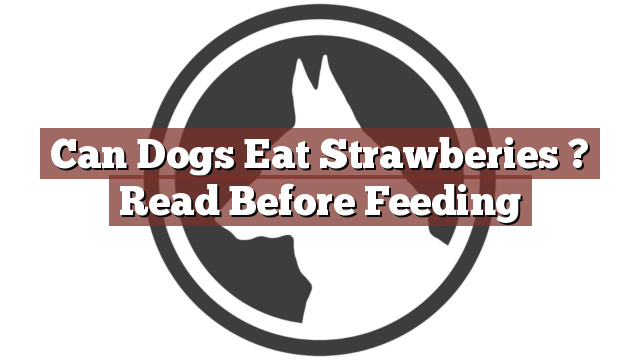Understanding Your Dog’s Dietary Needs
As a responsible pet owner, it is essential to understand your dog’s dietary needs to ensure their overall health and well-being. While dogs are primarily carnivorous animals, they can also benefit from incorporating certain fruits and vegetables into their diet. However, it is crucial to know which foods are safe for dogs to consume and which ones should be avoided. One common question that arises is, "Can dogs eat strawberries?"
Can Dogs Eat Strawberries? Read Before Feeding
Can dogs eat strawberries? The answer is yes. Strawberries are safe for dogs to eat in moderation. They are a delicious and nutritious treat that can be beneficial for your furry friend. Strawberries are low in calories and fat, making them a healthy option for dogs. They are also packed with vitamins such as vitamin C and fiber, which can support your dog’s immune system and digestive health.
Pros and Cons of Feeding Strawberries to Your Dog
Feeding strawberries to your dog can have several benefits. The high vitamin C content in strawberries can help boost your dog’s immune system and promote a healthy skin and coat. The fiber in strawberries can aid in digestion and regulate bowel movements for dogs prone to constipation. Additionally, strawberries are a great source of antioxidants, which can help fight against free radicals and reduce the risk of certain diseases in dogs.
However, it is important to feed strawberries to your dog in moderation. While strawberries are generally safe, excessive consumption can lead to digestive issues such as diarrhea or upset stomachs. It is also crucial to prepare strawberries properly before feeding them to your dog. Make sure to wash them thoroughly to remove any pesticides or dirt that may be present on the surface.
Conclusion: Considerations for Feeding Strawberries to Your Dog
In conclusion, strawberries can be a healthy and tasty snack for your dog when given in moderation. However, it is essential to consider a few factors before feeding strawberries to your furry friend. Always wash the strawberries properly, remove the stems and leaves, and cut them into small, bite-sized pieces to prevent choking hazards. It is also important to monitor your dog’s reaction to strawberries and any other new foods you introduce into their diet. If you notice any signs of allergies or digestive issues, it is best to consult with your veterinarian. By taking these considerations into account, you can safely incorporate strawberries into your dog’s diet and provide them with a nutritious treat they will love.
Thank you for taking the time to read through our exploration of [page_title]. As every dog lover knows, our furry friends have unique dietary needs and responses, often varying from one canine to another. This is why it's paramount to approach any changes in their diet with caution and knowledge.
Before introducing any new treats or making alterations to your dog's diet based on our insights, it's crucial to consult with a veterinarian about [page_title]. Their expertise ensures that the choices you make are well-suited to your particular pet's health and well-being.
Even seemingly harmless foods can sometimes lead to allergic reactions or digestive issues, which is why monitoring your dog after introducing any new food item is essential.
The content provided here on [page_title] is crafted with care, thorough research, and a genuine love for dogs. Nevertheless, it serves as a general guideline and should not be considered a substitute for professional veterinary advice.
Always prioritize the expert insights of your veterinarian, and remember that the health and happiness of your furry companion come first.
May your journey with your pet continue to be filled with joy, love, and safe culinary adventures. Happy reading, and even happier snacking for your canine friend!

